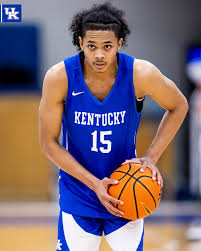Otega Oweh’s return to Kentucky basketball sent ripples through the college hoops world, not simply because the Wildcats are retaining one of their most explosive players, but because of the rare honesty and gratitude he’s shown for the NBA Draft process—despite ultimately withdrawing from it. In an era where athletes often rush toward the professional ranks, Oweh’s story is one of reflection, growth, and a renewed commitment to both personal development and his team.
The 6-foot-5 guard, who transferred to Kentucky last season and immediately became a key contributor, surprised some when he entered his name into the NBA Draft pool. It was seen as a logical step, given his athleticism, defensive prowess, and steadily improving offensive arsenal. But what wasn’t expected was just how valuable he would find the process—not necessarily as a springboard to an NBA roster spot this year, but as an eye-opening experience that changed how he views the game, his preparation, and even his leadership responsibilities.
According to Oweh, the decision to test the NBA waters wasn’t purely about chasing his dream but also about gathering feedback, identifying blind spots in his game, and learning firsthand what it takes to make it at the next level. “The draft process couldn’t have been more beneficial,” Oweh said in a recent interview. “From workouts with teams to talking to scouts and executives, I gained so much clarity. I know what I do well, but more importantly, I know exactly what I need to improve on to succeed in the NBA.”
Throughout the pre-draft process, Oweh participated in team workouts, interviews, and film sessions that offered him a new lens on his abilities. It wasn’t always flattering, but it was never discouraging. If anything, he emerged from those weeks more focused, hungrier, and confident than ever before. He described the experience as “an intense but honest mirror,” helping him understand what’s valued at the highest level and where he stands today.
Scouts praised his defensive tenacity, high motor, and elite athleticism. Many believe Oweh could eventually carve out a role in the NBA as a two-way player. But they also pointed out areas of development—particularly his consistency as a shooter, his shot creation in the half court, and his decision-making in crunch time. Oweh didn’t bristle at the criticism. Instead, he embraced it.
“That’s what I wanted—to know what I needed to work on. I didn’t go into this just trying to get a quick jump to the league. I wanted real feedback. And now I’ve got it. And I’m going to use it,” he said.
His time spent with professional organizations also sharpened his appreciation for the details. He recounted how even in brief workouts, the emphasis on precision, basketball IQ, and adaptability was paramount. For Oweh, who has always relied on his athletic gifts to make an impact, this was a reminder that talent alone doesn’t separate good from great.
“Every player at that level is talented. What separates guys is how much they understand the game, how quickly they make reads, how little they get rattled under pressure,” Oweh explained. “I saw what that looks like up close. I want to bring that to Kentucky this year.”
That mindset will be invaluable to the Wildcats, especially as the program enters a new chapter under recently hired head coach Mark Pope. With several key players either graduating, transferring, or heading to the pros, Kentucky needs continuity, experience, and mature leadership—and Oweh brings all three. But it’s not just about what he brings physically. His growth through the draft process now equips him to mentor teammates who may one day go through the same.
“I’ve been through it now. I know what scouts look for, I know what questions they ask, I know what makes you stand out. I can help our guys prepare. I can help them avoid mistakes. That’s part of my role now,” he said.
There’s also a sense that Oweh’s decision to return isn’t just about basketball—it’s personal. The love he’s developed for Lexington, for the Kentucky community, and for the fanbase that embraced him, has made his return feel less like a detour and more like a homecoming.
“It’s hard to explain, but this place feels right. The fans are amazing. The energy here, the support, the expectations—it pushes you,” Oweh said. “I didn’t come back just to play college ball again. I came back to finish what we started. I came back better.”
Indeed, his return instantly raises Kentucky’s ceiling. He averaged 11.4 points, 4.2 rebounds, and 1.5 steals per game last season while shooting nearly 49 percent from the field. His high-flying dunks, relentless perimeter defense, and highlight-reel blocks energized a young Wildcats squad that battled inconsistency throughout the year. But with another offseason of development, plus the wisdom gained through the draft evaluation process, Oweh is primed to take on an even larger role.
Kentucky fans should be excited. Oweh’s decision is emblematic of a new wave of college basketball players who are using the draft process not merely as an escape route, but as a tool for growth. With the NCAA allowing players to test the waters and return to school without losing eligibility, more athletes are discovering the value in gathering data, adjusting their games, and returning better prepared.



